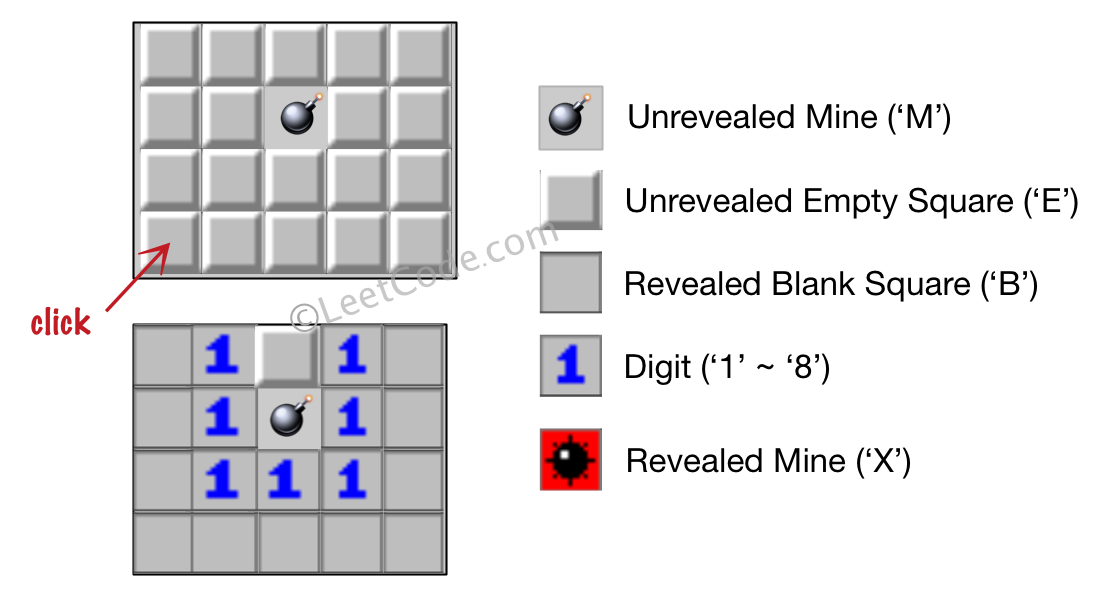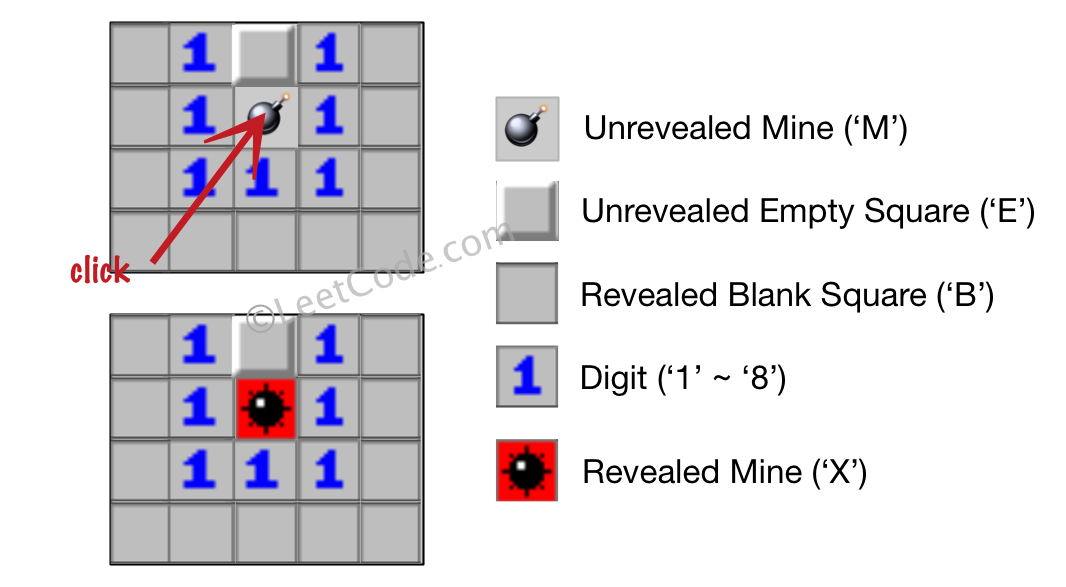https://leetcode.com/problems/minesweeper
https://discuss.leetcode.com/topic/80804/straight-forward-java-solution
You are given a 2D char matrix representing the game board. 'M' represents an unrevealed mine, 'E' represents an unrevealed empty square, 'B' represents a revealed blank square that has no adjacent (above, below, left, right, and all 4 diagonals) mines, digit ('1' to '8') represents how many mines are adjacent to this revealed square, and finally 'X' represents a revealed mine.
Now given the next click position (row and column indices) among all the unrevealed squares ('M' or 'E'), return the board after revealing this position according to the following rules:
- If a mine ('M') is revealed, then the game is over - change it to 'X'.
- If an empty square ('E') with no adjacent mines is revealed, then change it to revealed blank ('B') and all of its adjacent unrevealed squares should be revealed recursively.
- If an empty square ('E') with at least one adjacent mine is revealed, then change it to a digit ('1' to '8') representing the number of adjacent mines.
- Return the board when no more squares will be revealed.
Example 1:
Input: [['E', 'E', 'E', 'E', 'E'], ['E', 'E', 'M', 'E', 'E'], ['E', 'E', 'E', 'E', 'E'], ['E', 'E', 'E', 'E', 'E']] Click : [3,0] Output: [['B', '1', 'E', '1', 'B'], ['B', '1', 'M', '1', 'B'], ['B', '1', '1', '1', 'B'], ['B', 'B', 'B', 'B', 'B']] Explanation:
Example 2:
Input: [['B', '1', 'E', '1', 'B'], ['B', '1', 'M', '1', 'B'], ['B', '1', '1', '1', 'B'], ['B', 'B', 'B', 'B', 'B']] Click : [1,2] Output: [['B', '1', 'E', '1', 'B'], ['B', '1', 'X', '1', 'B'], ['B', '1', '1', '1', 'B'], ['B', 'B', 'B', 'B', 'B']] Explanation:
Note:
- The range of the input matrix's height and width is [1,50].
- The click position will only be an unrevealed square ('M' or 'E'), which also means the input board contains at least one clickable square.
- The input board won't be a stage when game is over (some mines have been revealed).
- For simplicity, not mentioned rules should be ignored in this problem. For example, you don't need to reveal all the unrevealed mines when the game is over, consider any cases that you will win the game or flag any squares.
public class Solution {
public char[][] updateBoard(char[][] board, int[] click) {
int x = click[0], y = click[1];
if (board[x][y] == 'M') {
board[x][y] = 'X';
return board;
}
dfs(board, x, y);
return board;
}
int[] dx = {-1, 0, 1, -1, 1, 0, 1, -1};
int[] dy = {-1, 1, 1, 0, -1, -1, 0, 1};
private void dfs(char[][] board, int x, int y) {
if (x < 0 || x >= board.length || y < 0 || y >= board[0].length || board[x][y] != 'E') return;
int num = getNumsOfBombs(board, x, y);
if (num == 0) {
board[x][y] = 'B';
for (int i = 0; i < 8; i++) {
int nx = x + dx[i], ny = y + dy[i];
dfs(board, nx, ny);
}
} else {
board[x][y] = (char)('0' + num);
}
}
private int getNumsOfBombs(char[][] board, int x, int y) {
int num = 0;
for (int i = -1; i <= 1; i++) {
for (int j = -1; j <= 1; j++) {
int nx = x + i, ny = y + j;
if (nx < 0 || nx >= board.length || ny < 0 || ny >= board[0].length) continue;
if (board[nx][ny] == 'M' || board[nx][ny] == 'X') {
num++;
}
}
}
return num;
}
This is a typical
Search problem, either by using DFS or BFS. Search rules:- If click on a mine ('
M'), mark it as 'X', stop further search. - If click on an empty cell ('
E'), depends on how many surrounding mine:
2.1 Has surrounding mine(s), mark it with number of surrounding mine(s), stop further search.
2.2 No surrounding mine, mark it as 'B', continue search its8neighbors.
DFS solution.
public char[][] updateBoard(char[][] board, int[] click) {
int m = board.length, n = board[0].length;
int row = click[0], col = click[1];
if (board[row][col] == 'M') { // Mine
board[row][col] = 'X';
}
else { // Empty
// Get number of mines first.
int count = 0;
for (int i = -1; i < 2; i++) {
for (int j = -1; j < 2; j++) {
if (i == 0 && j == 0) continue;
int r = row + i, c = col + j;
if (r < 0 || r >= m || c < 0 || c < 0 || c >= n) continue;
if (board[r][c] == 'M' || board[r][c] == 'X') count++;
}
}
if (count > 0) { // If it is not a 'B', stop further DFS.
board[row][col] = (char)(count + '0');
}
else { // Continue DFS to adjacent cells.
board[row][col] = 'B';
for (int i = -1; i < 2; i++) {
for (int j = -1; j < 2; j++) {
if (i == 0 && j == 0) continue;
int r = row + i, c = col + j;
if (r < 0 || r >= m || c < 0 || c < 0 || c >= n) continue;
if (board[r][c] == 'E') updateBoard(board, new int[] {r, c});
}
}
}
}
return board;
}
BFS solution. As you can see the basic logic is almost the same as DFS. Only added a queue to facilitate BFS.
public char[][] updateBoard(char[][] board, int[] click) {
int m = board.length, n = board[0].length;
Queue<int[]> queue = new LinkedList<>();
queue.add(click);
while (!queue.isEmpty()) {
int[] cell = queue.poll();
int row = cell[0], col = cell[1];
if (board[row][col] == 'M') { // Mine
board[row][col] = 'X';
}
else { // Empty
// Get number of mines first.
int count = 0;
for (int i = -1; i < 2; i++) {
for (int j = -1; j < 2; j++) {
if (i == 0 && j == 0) continue;
int r = row + i, c = col + j;
if (r < 0 || r >= m || c < 0 || c < 0 || c >= n) continue;
if (board[r][c] == 'M' || board[r][c] == 'X') count++;
}
}
if (count > 0) { // If it is not a 'B', stop further DFS.
board[row][col] = (char)(count + '0');
}
else { // Continue BFS to adjacent cells.
board[row][col] = 'B';
for (int i = -1; i < 2; i++) {
for (int j = -1; j < 2; j++) {
if (i == 0 && j == 0) continue;
int r = row + i, c = col + j;
if (r < 0 || r >= m || c < 0 || c < 0 || c >= n) continue;
if (board[r][c] == 'E') {
queue.add(new int[] {r, c});
board[r][c] = 'B'; // Avoid to be added again.
}
}
}
}
}
}
return board;
}public char[][] updateBoard(char[][] board, int[] click) {
int m = board.length, n = board[0].length;
int x = click[0], y = click[1];
if (board[x][y] == 'M') {
board[x][y] = 'X';
return board;
}
Queue<Integer> queue = new LinkedList<>();
queue.offer(x * n + y);
while (!queue.isEmpty()) {
int idx = queue.poll();
int curX = idx / n, curY = idx % n;
int num = getNumberOfBombs(board, curX, curY);
if (num == 0) {
board[curX][curY] = 'B';
for (int i = -1; i < 2; i++) {
for (int j = -1; j < 2; j++) {
if (i == 0 && j == 0) continue;
int newX = curX + i, newY = curY + j;
if (newX < 0 || newY < 0 || newX >= board.length || newY >= board[0].length || board[newX][newY] != 'E') continue;
queue.offer(newX * n + newY);
board[newX][newY] = 'B'; // Avoid being added again
}
}
} else {
board[curX][curY] = (char)(num + '0');
}
}
return board;
}
private int getNumberOfBombs(char[][] board, int x, int y) {
int count = 0;
for (int i = -1; i < 2; i++) {
for (int j = -1; j < 2; j++) {
if (i == 0 && j == 0) continue;
int newX = x + i, newY = y + j;
if (newX < 0 || newY < 0 || newX >= board.length || newY >= board[0].length) continue;
if (board[newX][newY] == 'M' || board[newX][newY] == 'X') count++;
}
}
return count;
}